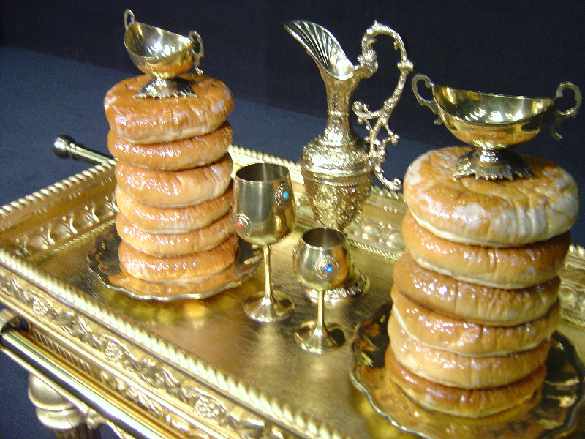There are many mysteries surrounding the Last Supper. Why the sneaky, obviously pre-arranged business of sending the disciples to looking for a man carrying water to provide a place for the meal (Mk. 14:13-15)? What kind of meal was it – an ordinary dinner with Jesus and his closest disciples (as John said) or the sacred Passover meal (as the other three evangelists claimed)? Why did he say some of the things he said, like asking how many swords they had? (“ And they said, “Look, Lord, here are two swords.” And he said to them, “It is enough.” – Lk. 22:38) Why is the part about the bread and wine related plainly in Matthew, Mark, and Luke, and completely obscured in John? And what did it all mean, anyway?
It’s likely we’ll never definitively know. But we can guess a few things, I think. For one thing, I don’t believe it was a Passover meal – at least not one on the same calendar as most everyone else. Since the lamb consumed was later seen as a type, or symbol pointing to Jesus’ upcoming sacrificial death, if he and the boys had been doing Passover that night, it seems to me he would much more likely have identified himself with it. “This is my body,” I think, would have been said over the lamb, not the bread.
To understand this a bit further, we must ask ourselves when was bread ever sacrificed? After the patriarchs, the sole reference is to the Bread of the Presence (also called the “showbread“; in King James’ “shewbread”) – a dozen sacred loaves placed weekly on a special table in the Holy Place of the Temple, eaten there by the priests. And sure enough, Jesus identifies it explicitly: “And he took bread, and when he had given thanks he broke it and gave it to them, saying, ‘This is my body which is given for you. Do this in remembrance of me.’” (Lk. 22:19 Emphasis added.)
Likewise, what about the wine? “This cup which is poured out for you is the new covenant in my blood.” (Mt. 26:27 Emphasis added.) The only wine “poured out” in sacrifice were the drink-offerings offered daily in the Temple. And they were kept on the same table: “And over the table of the bread of the Presence they shall spread a cloth of blue, and put upon it the plates, the dishes for incense, the bowls, and the flagons for the drink offering; the continual bread also shall be on it” (Num. 4:7 Emphasis added.)
The reason for this emphasis on bread and wine may be simply ancestry. Jesus was of the line of David, a Benjaminite, while only descendants of Aaron could be Levitical priests. Therefore, the sole role of priest Jesus might legitimately claim was that of Melchizedek, who blessed Abraham (and got some nice offerings in return). “And Melchizedek king of Salem brought out bread and wine; he was priest of God Most High.” (Gen. 14:18 Emphasis added)
This may refer to other conundrums, too. One famous incident referred to by all three synoptics is how the disciples were going through the fields one Saturday and plucked the grain to eat (Mt. 12:1-7, Mk. 2:23-28, Lk. 8:1-5). And the Pharisees gave him a hard time about it. So to justify himself, Jesus tells them about how David went into the Temple and ate the Bread of the Presence, concluding in all three versions that, “The Son of Man is lord of the Sabbath.”
In Mark’s account, there is a very curious addition. Jesus doesn’t just say “in the time of David“, he further specifies it as “when Abiathar was high priest” (Mk. 2:25) However, this is wrong! It wasn’t when Abiathar was the high priest, but his father Ahimelech:
And David said to Ahimelech the priest, “The king has charged me with a matter, and said to me, ‘Let no one know anything of the matter about which I send you, and with which I have charged you.’ I have made an appointment with the young men for such and such a place.
Now then, what have you at hand? Give me five loaves of bread, or whatever is here.”
And the priest answered David, “I have no common bread at hand, but there is holy bread; if only the young men have kept themselves from women.”
And David answered the priest, “Of a truth women have been kept from us as always when I go on an expedition; the vessels of the young men are holy, even when it is a common journey; how much more today will their vessels be holy?”
So the priest gave him the holy bread; for there was no bread there but the bread of the Presence, which is removed from before the Lord, to be replaced by hot bread on the day it is taken away. [1Sam. 22:2-6]
A wicked spy, Doeg the Edomite, heard this and reported the incident to King Saul, who ordered him to slay Ahimelech, and the other priests there. “He killed on that day eighty-five persons who wore the linen ephod. And Nob, the city of the priests, he put to the sword; both men and women, children and sucklings, oxen, asses and sheep, he put to the sword.” [1 Sam. 22:18-19] So David fled to Gath, Goliath’s hometown, where to save himself from the Philistines, he pretended he was crazy, which is another story…
Anyway, Abiathar was not present at the massacre, survived, and then became David’s high priest, helping him with the mysterious oracle of the Urim and Thummin.
It should be noted that to get his cooperation, David lied to the high priest. Also, there is a question of who all was present. Jesus made it sound like they were all there together, whereas in Samuel, David went alone.
But most importantly, David refers to his band of warriors, his “mighty men,” as almost equivalent to priests, being equally as ritually pure. Could that be the point? Did Jesus make this obvious-seeming goof (which, by the way, two thousand years of Christian scholars have ignored) as a red flag, to call attention to the role he wished his disciples to adopt?
So the bread of the Last Supper was the Bread of the Presence, the wine was the sacred drink offering, and the Apostles were Jesus’ mighty men. These new details about that most important event may give us an insight into what really was going on that night.
Unfortunately, such a profoundly simple solution was passed over. The Roman Catholic Church adopted another interpretation that rigidly adheres to their literal, gory, and irrational explanation of just what Communion with Christ means. Here’s a hint – magic requires magicians.
To be continued…
Posts on Holy Week and Easter:
- What Bread and Which Wine?
- Why the Empty Tomb?
- Close Encounters of the Resurrected Kind
- The Strangeness of the Risen Christ

